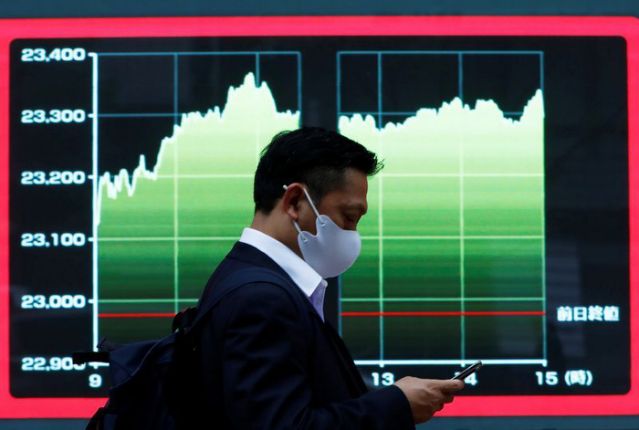
(Reuters) – Asian shares jumped on Tuesday, with Japanese stocks hitting a 29-year high, as hopes that a long-awaited U.S. pandemic relief package would be expanded and a Brexit trade deal supported investor risk appetites.
Japan’s Nikkei leapt 0.9% to its highest since March 1991, while Australian shares climbed 0.7% and futures for the S&P 500 added 0.3%.
The U.S. House of Representatives had voted earlier to increase stimulus payments to qualified Americans to $2,000 from $600, sending the measure on to the Senate for a vote.
While it is not clear how the measure will fare in the Senate, President Donald Trump’s signing on Sunday of a $2.3 trillion pandemic bill, which included the $600 payments, had sent shares on Wall Street to record highs overnight as it increased optimism about an economic recovery. [.N]
“With the Brexit…and the U.S. stimulus deal now in the rear-view mirror, there is a sense of relief that we have avoided the respective worst-case scenarios,” said Stephen Innes, chief global market strategist at Axi, a broker.
Firmer demand for riskier assets kept the U.S. dollar, which is often seen as a “safe-haven” asset, on the back foot. It was down 0.02% against a basket of major currencies.
Shorting the dollar has been a popular trade recently and calculations by Reuters based on data released by the Commodity Futures Trading Commission on Monday suggested this could endure. Short positions on the dollar swelled in the week ended Dec. 21 to $26.6 billion, the highest in three months.
Sterling softened to $1.3462 as investors continued to take profits in the currency following the confirmation last week of a trade UK-EU trade deal that was widely expected.
A sluggish dollar bolstered gold prices, which rose 0.4% to $1,878.76 an ounce.
Oil prices recovered a touch after falling overnight on concerns that new travel restrictions on the back of the COVID-19 pandemic would weaken fuel demand, and as the prospect of increased supply dragged on prices.






